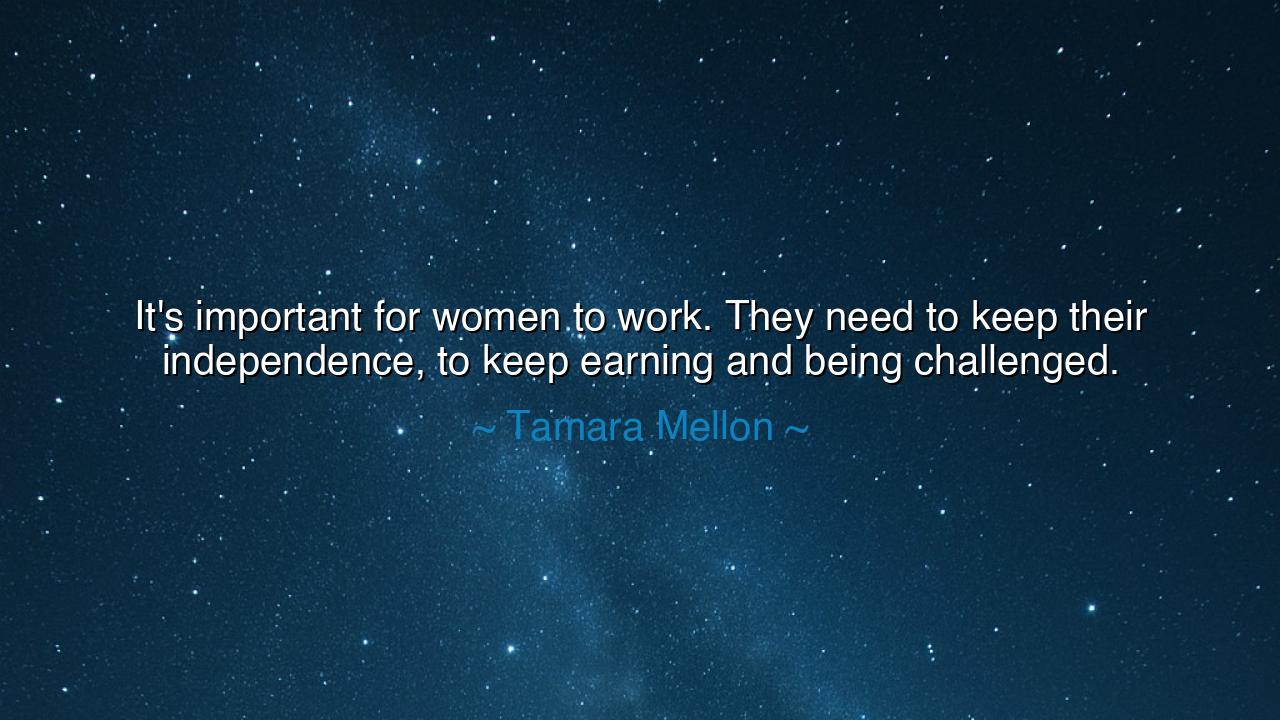
It's important for women to work. They need to keep their
It's important for women to work. They need to keep their independence, to keep earning and being challenged.






"It's important for women to work. They need to keep their independence, to keep earning and being challenged." – Tamara Mellon
Listen well, O daughters and sons of the future, to the voice of Tamara Mellon, who speaks not merely of labor, but of dignity, of purpose, and of the sacred flame of independence that must never be extinguished. In her words, she reminds us that work is not only the means by which one earns a living, but the forge through which the soul stays sharp and alive. For when a woman works, she does not merely sustain herself — she claims her place in the world, shaping her destiny by the strength of her own hands and the brilliance of her own mind.
The meaning of Mellon’s words lies in the deep truth that independence is the foundation of freedom. To work, to earn, and to be challenged is to remain connected to the pulse of growth and change — to refuse the slow decay that comes when life becomes passive or dependent. She speaks especially to women, for too long the world has whispered that their place is behind, not beside; to serve, not to lead. But the age of silence has passed. When a woman works, she becomes not just a contributor, but a creator — an equal architect of the human story.
The origin of her insight rises from her own journey. Tamara Mellon, co-founder of the luxury brand Jimmy Choo, built her success through vision, discipline, and fierce independence. She knew the challenges of business and the burden of expectation, yet she stood her ground — creating beauty not only through design but through determination. In her, we see the embodiment of her own words: a woman who did not wait for permission, but who took her rightful place in the world of commerce and creativity. Her call, then, is not one of pride, but of empowerment — that every woman must hold onto her independence as both shield and sword in a world that often seeks to take it away.
History itself bears witness to this truth. Consider Marie Curie, the first woman to win a Nobel Prize, whose tireless work in science illuminated the unseen forces of nature. Though she faced isolation, poverty, and prejudice, she pressed on — challenged at every turn, yet unbroken. Her labor was not merely for fame or discovery, but for the integrity of the human spirit — the conviction that a woman’s intellect was no less radiant than a man’s. Or think of Sojourner Truth, who worked not only with her hands but with her voice, speaking against slavery and injustice, reminding the world that the work of a woman is sacred, whether in the field, the home, or the public square.
Mellon’s wisdom carries also a warning: that to lose independence is to risk losing the self. When one ceases to strive, to learn, to grow, the fire within begins to fade. Work, then, is not merely toil — it is life in motion. It keeps the mind sharp, the heart engaged, and the spirit proud. To earn one’s way is to affirm one’s worth, to know that what one has was not bestowed by favor, but won by effort. And to be challenged is to remain young — for only in struggle does potential become power, and only through resistance does the soul discover its strength.
Let every woman, then, heed this teaching: cherish your independence as you would your breath. Let your work, whether in art, business, science, or home, be your temple of self-respect. Seek not ease, but purpose. Demand not pity, but opportunity. For in your labor lies your liberation — and in your challenges, your awakening. A woman who works is not diminished; she is magnified, for she stands as proof that strength and grace can dwell in one vessel.
And to the world that watches, let this be a lesson of remembrance: the prosperity of any people depends on the freedom of its women — their ability to earn, to create, to stand unafraid before the trials of life. When they rise, the whole of humanity rises with them. So may Tamara Mellon’s words ring through the ages, a call to courage and to action: Work not only for bread, but for independence; not only for gain, but for growth. For to work is to live, and to live fully — as woman, as man, as human — is the truest act of freedom.






AAdministratorAdministrator
Welcome, honored guests. Please leave a comment, we will respond soon